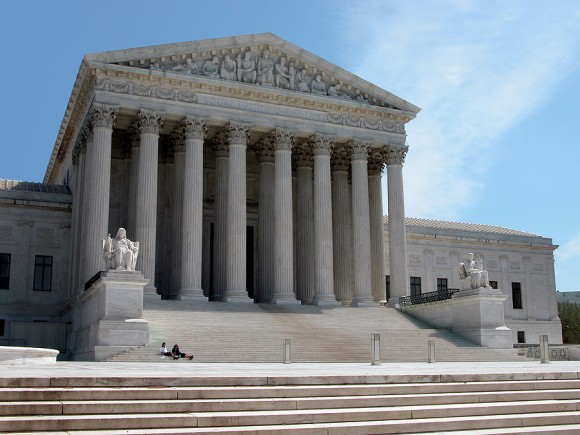The U.S. Supreme Court delivered a blow to the rights of workers on Monday by allowing companies to require them to sign away their ability to bring class-action claims against management, agreements already in place for about 25 million employees.
The justices, in a 5-4 ruling with the court’s conservatives in the majority, endorsed the legality of the growing practice by companies to compel workers to sign arbitration agreements waiving their right to bring class-action claims on various disputes, primarily over wages and hours.
The ruling could apply more broadly to discrimination claims like those raised by women as part of the #MeToo movement raising awareness of sexual harassment in the workplace but the court did not explicitly address that issue.
Craig Becker, a former member of the U.S. National Labor Relations Board and now general counsel of the AFL-CIO union federation, said the decision will have a “chilling effect” on employees coming forward to complain of mistreatment.
“It will cripple enforcement of all the major employment laws,” Becker added.
Growing numbers of employers, alarmed by a rise in class-action claims brought by workers on wage issues, have demanded that their workers sign waivers. Class-action litigation can result in large damages awards by juries and is harder for businesses to fight than cases brought by individual plaintiffs.
Republican President Donald Trump’s administration last year reversed the government’s stance in the case, siding with the companies. The Justice Department said it was pleased with Monday’s ruling. Democratic former President Barack Obama’s administration had supported a decision made by the National Labor Relations Board in 2012 invalidating such employment agreements. The board at the time had a Democratic majority.
The ruling is the latest in a series of pro-business decisions by the conservative-majority Supreme Court in recent years curbing class-action claims of various types and endorsing arbitration to resolve contractual disputes. Companies have said arbitration is quicker and cheaper than litigation in court.
States May Copy California’s Law to Give Employees Right to File Class Actions
Justice Neil Gorsuch, Trump’s appointee to the court, wrote the ruling, joined by the four other conservative justices. Gorsuch wrote that federal arbitration law does not conflict with the National Labor Relations Act, which outlines the right of workers to act collectively.
“The policy may be debatable but the law is clear: Congress has instructed that arbitration agreements like those before us must be enforced as written,” Gorsuch wrote.
Workers have fought back against the waivers, arguing that the cost of pursuing their cases individually in arbitration is prohibitively expensive. The ruling does not affect workers represented by unions.
Writing in dissent on behalf of the court’s four liberals, Justice Ruth Bader Ginsburg called the ruling “egregiously wrong” and urged Congress to take action to protect workers’ rights.
‘Take It or Leave It’
“The court today holds enforceable these arm-twisted, take-it-or-leave-it contracts — including the provisions requiring employees to litigate wages and hours claims only one-by-one. Federal labor law does not countenance such isolation of employees,” Ginsburg said in a statement she read in court.
Ginsburg said she does not believe the ruling would apply to certain claims alleging discrimination on the basis of race, gender, religion or national origin covered by Title VII of the landmark federal Civil Rights Act.
Civil rights advocates were not so sure.
“Today’s decision will make it easier for employers to escape liability for widespread discrimination and harassment. No American should be forced to sign away their right to invoke the meaningful protections afforded by our nation’s critical civil rights laws,” said Kristen Clarke, president of the Lawyers’ Committee for Civil Rights Under Law.
The ruling came in the biggest business case of the court’s current term, which began in October runs through the end of June.
The court in the coming weeks is due to rule in another big workers’ rights case involving a conservative challenge to fees that public-sector workers like police and teachers who are not union members are forced to pay to unions in certain states to cover the expenses of collecting bargaining.
The three consolidated cases decided on Monday involved professional services firm Ernst & Young LLP, gas station operator Murphy Oil USA Inc and healthcare software company Epic Systems Corporation.
“When it comes to grievances regarding wages and hours, we believe individual arbitration agreements strike that reasonable balance and are pleased with the court’s decision in support of this,” Epic CEO Judy Faulkner said in a statement.
The NLRB argued that the waivers violate federal labor law and let companies evade their responsibilities under workplace statutes.
About one in four private-sector non-union employees have signed arbitration agreements that include class-action waivers, according to the liberal-leaning Economic Policy Institute.
One U.S. law firm, Ogletree Deakins, seized on the ruling by launching a service it said will help employers create arbitration agreements containing class-action waivers for employees in less than five minutes.
(Reporting by Lawrence Hurley; Editing by Will Dunham)
Related:
- Workplace Class Action Litigation Report: 2018
- What Are Chances a U.S Business Will Face an Employee Lawsuit?
- In 2017, Labor Lawyers Raced to Settle Class Actions Before Trump Effect
- Supreme Court Walmart Ruling Shakes Up Employment Class Action
- How States Compare for Risk of Employee Lawsuits: Hiscox
Topics Lawsuits USA Claims Commercial Lines Business Insurance
Was this article valuable?
Here are more articles you may enjoy.



 Lemonade Books Q4 Net Loss of $21.7M as Customer Count Grows
Lemonade Books Q4 Net Loss of $21.7M as Customer Count Grows  Viewpoint: Runoff Specialists Have Evolved Into Key Strategic Partners for Insurers
Viewpoint: Runoff Specialists Have Evolved Into Key Strategic Partners for Insurers  AIG’s Zaffino: Outcomes From AI Use Went From ‘Aspirational’ to ‘Beyond Expectations’
AIG’s Zaffino: Outcomes From AI Use Went From ‘Aspirational’ to ‘Beyond Expectations’  Jury Finds Johnson & Johnson Liable for Cancer in Latest Talc Trial
Jury Finds Johnson & Johnson Liable for Cancer in Latest Talc Trial 

